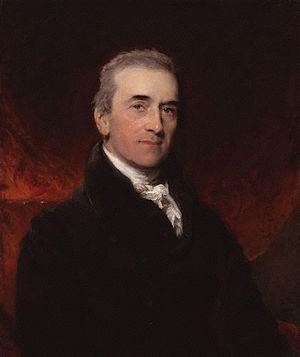Samuel Romilly

Samuel Romilly (born March 1, 1757 in London ( Soho ), † November 2, 1818 ibid) was a British lawyer and politician. He sympathized with the ideas of the French Enlightenment around Denis Diderot and Paul Henri Thiry d'Holbach .
Live and act
Romilly was born on Frith Street in Soho as the second son of Peter Romilly (around 1711–1784), a watchmaker and jeweler, and his wife Margaret Romilly, a née Garnault (around 1715–1796). Both came from Huguenot families. Samuel Romilly had a brother Thomas Peter Romilly and a sister, the later Catherine Roget. His grandfather, Stephen Romilly (around 1678-1733), fled to England from Montpellier after the Edict of Nantes was repealed (October 18, 1685). He was married to Judith Romilly, a née de Monsallier.
Samuel Romilly worked for a time in his father's craft business and business and received instruction from a private tutor, preceptor . He was also made thoroughly familiar with the French language and received a solid humanistic education. After spending and serving in the law office of William Michael Lally, he became a member of Gray's Inn on May 5, 1778 . He was admitted to the bar on June 2, 1783.
But before that in 1781 he went on a trip to Geneva , where he made the acquaintance and established a lifelong friendship with the Geneva publicist Pierre Étienne Louis Dumont (1759-1829), a friend of Honoré Gabriel de Riqueti, comte de Mirabeau . But he also visited Paris and met Denis Diderot, D'Alembert and Paul Henri Thiry d'Holbach , to whose coterie he went. The coterie holbachique ("Holbach clique") was of particular importance for the exchange of views in Holbach's environment . The word referred to a group of people who were close to the Enlightenment and who during the second half of the 18th century met regularly on Thursdays and Sundays for several decades for dinner at Holbach's in order to freely discuss various topics.
Romilly was an outspoken opponent of the slave trade . It was Granville Sharp who, together with Thomas Clarkson , decided in 1787 to found the Society for the Abolition of the Slave Trade . Romilly was a staunch supporter of this organization.
Romilly was married to Anne Garbett, the daughter of Francis Garbett, ( Herefordshire ) since 1798 . The couple had two sons, Sir John Romilly (1802-1874), a later lawyer and politician who was raised to the nobility as Baron Romilly in 1866, and Frederick Romilly (1810-1887), also a politician. In 1806 Romilly became a Member of the House of Commons as Members of Parliament , MP for Queenborough .
On October 29, 1818, his wife Anne Romilly died on the Isle of Wight . In his deep grief and desperation he committed suicide and died in his house in Russell Square , London on November 2, 1818. His nephew Peter Mark Roget stood by the dying man and wrote down his last word: My dear, I wish .. probably about his late wife. He was buried in a family grave near Presteigne , in Radnorshire , Wales .
Works (selection)
- Thoughts on Executive Justice. (1786)
- Memoirs of the life of Samuel Romilly. (1840)
Web links
Individual evidence
- ^ Crown copyright and The History of Parliament Trust 1964-2014. Detailed biography in English
- ^ Crown copyright and The History of Parliament Trust 1964-2014.
- ↑ Kendall, Joshua: The Man Who Made Lists: love, death, madness, and the creation of "Roget's Thesaurus" . GP Putnam's Sons, New York 2008, ISBN 978-0-399-15462-1 .
- ↑ Baltimore Gazette, Baltimore, MD, Jan. 8, 1834, p. 2.
| personal data | |
|---|---|
| SURNAME | Romilly, Samuel |
| BRIEF DESCRIPTION | British lawyer and politician |
| DATE OF BIRTH | March 1, 1757 |
| PLACE OF BIRTH | London |
| DATE OF DEATH | November 2, 1818 |
| Place of death | London |
